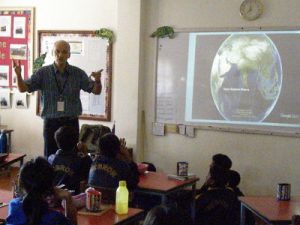A child could tell you

I was invited to discuss with 5th standard children at Hebron, Ooty, about the elephant corridors of the Masinagudi-Sigur Region. I was surprised by this choice, but many children live in and around Ooty and are familiar with the difficult issue of maintaining passages for elephants. Their teacher asked them to define an action plan and my role was to help them understand some of the technical issues. The class was curious about the identification of corridors, which is done with field data, maps and whatever relevant document put together in a geographic information system (GIS). We also watched our video Maximus (link here) in order to help them realize that a corridor’s width depends on human activity. Whenever humans are discreet, corridors can be narrow, whenever humans are causing disturbance, corridors must be wide so that animals can move around. After a week or so later, I was requested to rate their action plan. I was not disappointed.
All the children had concluded something like: “elephants are harassed, the Government should remove anyone in the way of the animals, punish encroachment, night safaris, flashing wildlife, etc.” At first, I was surprised and smiled of the innocence borne by these statements. But I could not find anything wrong with them. The children proposed solutions that targeted people who mostly, are in the wrong. So what should adults be doing? Should we teach children to compromise and continue to destroy a world that will soon belong to them, or should we learn from them? The truth is that many scientists are concerned that if we continue to damage our biosphere the way we do, humanity will face enormous problems. These problems have the potential to ruin our civilization. It is strange that children sense potential solutions when we, adults, cannot. My only explanation for this amazing state-of-affairs is that greed and compromise haven’t destroyed their power of reason yet. And actually, when you think about it, we humans show very little reason in the way we manage our planet.
Jean-Philippe Puyravaud
